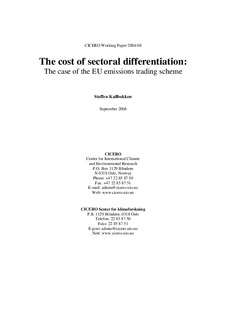| dc.contributor.author | Kallbekken, Steffen | nb_NO |
| dc.date.accessioned | 2014-03-17T14:31:22Z | |
| dc.date.available | 2014-03-17T14:31:22Z | |
| dc.date.issued | 2004 | nb_NO |
| dc.identifier.issn | 0504-452X | nb_NO |
| dc.identifier.uri | http://hdl.handle.net/11250/192314 | |
| dc.description.abstract | It is often assumed in the economic literature that the Kyoto Protocol will be implemented through a cost-efficient, comprehensive emissions trading system. However, the general experience from implementation of environmental policies suggests that governments will adopt a more differentiated approach. Emerging evidence on how the Kyoto Protocol will be implemented confirms this: climate commitments will be differentiated between sectors. This paper assesses the welfare effects associated with implementing the EU emissions trading Directive – or a similar scheme for other regions. It also analyses how differentiation of commitments affects the sectors that have a permit obligation compared to those that are exempted from it. Findings indicate that sectoral differentiation comes at a relatively high welfare cost – in all scenarios more than tripling the cost of implementing climate policy, with only limited benefits to the sectors that are granted concessions. | nb_NO |
| dc.language.iso | eng | nb_NO |
| dc.publisher | CICERO Center for International Climate and Environmental Research - Oslo | nb_NO |
| dc.relation.ispartof | CICERO Working Paper | nb_NO |
| dc.relation.ispartofseries | CICERO Working Paper;2004:08 | nb_NO |
| dc.title | The cost of sectoral differentiation: The case of the EU emissions trading scheme | nb_NO |
| dc.type | Working paper | nb_NO |
| dc.source.pagenumber | | nb_NO |
